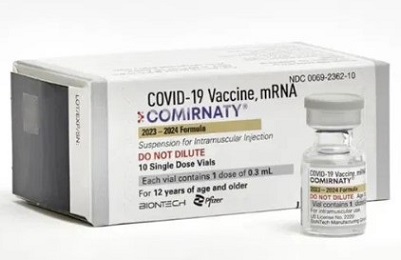BREAKING COVID-19 News! Japanese Study Reveals That New XBB.1.5 Monovalent XBB.1.5 Is Not Effective Against Circulating SARS-CoV-2 Variants!
Nikhil Prasad Fact checked by:Thailand Medical News Team Dec 01, 2023 2 years, 2 months, 1 week, 6 days, 5 hours, 40 minutes ago
COVID-19 News: In a pivotal turn of events, a recent study conducted by the prestigious University of Tokyo has shed light on potential challenges regarding the efficacy of the XBB.1.5 monovalent mRNA vaccine against circulating SARS-CoV-2 variants and sub-lineages, particularly the concerning Omicron XBB subvariants. Introduced in September 2023 to address the evolving threat of SARS-CoV-2, the XBB.1.5 vaccine is now under intense scrutiny for its ability to induce humoral immunity against emerging variants. At that time, numerous manipulated studies and controlled
COVID-19 News coverages claimed that the new monovalent XBB.1.5 vaccine was effective against all the circulating SARS-CoV-2 variants and sub-lineages including newly identified 2.86 variant and its emerging sub-lineages. The WHO, the U.S. CDC, the ECDC and also the U.S. NIH along with various garbage influencers in twitter (now stupidly renamed as X) also assured that the new monovalent vaccine was effective against all the various new strains and sub-lineages and kept on advocating that people take these vaccines to protect themselves against the anticipated year end COVID-19 surges.
https://www.yalemedicine.org/news/updated-covid-vaccine-10-things-to-know
https://asm.org/articles/2023/october/updated-covid-19-booster-xbb15-what-to-know
https://erictopol.substack.com/p/the-ba286-variant-and-the-new-booster
https://twitter.com/RajeevJayadevan/status/1659246777487470592
https://www.cdc.gov/mmwr/volumes/72/wr/mm7207a3.htm?s_cid=mm7207a3_w#T1_down

The study, conducted with meticulous precision, delved into the immune responses of individuals who received the XBB.1.5 vaccine. The two primary groups under investigation were individuals with no prior SARS-CoV-2 infection and those with a history of XBB subvariant infection before being vaccinated with XBB.1.5.
To comprehensively assess the vaccine's impact, sera samples were collected from both groups before and 3-4 weeks after vaccination. These samples were then subjected to a neutralization assay, employing pseudoviruses that mimic various SARS-CoV-2 variants, including XBB subvariants (XBB.1.5, XBB.1.16, XBB.2.3, EG.5.1, HK.3), and the prominent BA.2.86.
Initial findings unearthed intriguing insights. Despite natural infection with XBB subvariants, including XBB.1.5, failing to efficiently induce humoral immunity against the infecting subvariants, the XBB.1.5 monovalent vaccine demonstrated promising results. This prompted questions regarding the vaccine's ability to generate humoral immunity against the ever-evolving landscape of SARS-CoV-2 variants.
gt;
Comparative analyses revealed a significant boost in antiviral humoral immunity after XBB.1.5 vaccination in both cohorts, indicating the potential of the vaccine to induce protection against XBB subvariants and BA.2.86, even in individuals without prior infection.
However, a nuanced examination of the data brought forth critical distinctions. While the induction efficiency of neutralizing activity was comparable between the infection-naïve cohort and the XBB-infected cohort, pre-vaccination sera from the latter exhibited significantly higher neutralization titers. This suggests that individuals with a history of XBB subvariant infection may mount a more robust initial immune response.
Diving deeper into the findings, it was revealed that a subset of individuals vaccinated with the XBB.1.5 vaccine, devoid of prior natural infection, displayed no antiviral activity against specific variants. Notably, against XBB.1.5, XBB.1.16, XBB.2.3, EG.5.1, HK.3, and BA.2.86, a select group exhibited no measurable antiviral activity in their pre-vaccination sera.
These nuanced observations prompt a reevaluation of the current vaccination strategy. The study posits that a single dose of the XBB.1.5 monovalent vaccine may not be sufficiently robust to induce effective antiviral humoral immunity in infection-naïve individuals. It cautiously suggests that, in some instances, a booster dose of the XBB.1.5 monovalent vaccine might be imperative to ensure comprehensive protection against emerging SARS-CoV-2 variants.
This groundbreaking study underscores the need for continuous research and vigilance in monitoring vaccine efficacy amid the ever-evolving landscape of viral threats. As the global community grapples with the persisting challenges posed by the COVID-19 pandemic, staying abreast of the latest developments in vaccine research is paramount for informed public health decision-making. The revelations from this study beckon further investigation and consideration as the world collectively navigates through these uncharted territories.
Interestingly, at this very moment, various corrupted governments and ignorant and incompetent health authorities are still pushing the monovalent XBB.1.5 COVID-19 vaccine and are claiming that it will protect the public against the current COVID-19 surges.
The study was conducted by the prestigious Sato laboratory Of Virology at the University of Tokyo, Japan.
The study findings were published on preprint server and are currently being peer reviewed.
https://www.biorxiv.org/content/10.1101/2023.11.29.569330v1
For the latest
COVID-19 News, keep on logging to Thailand Medical News.
